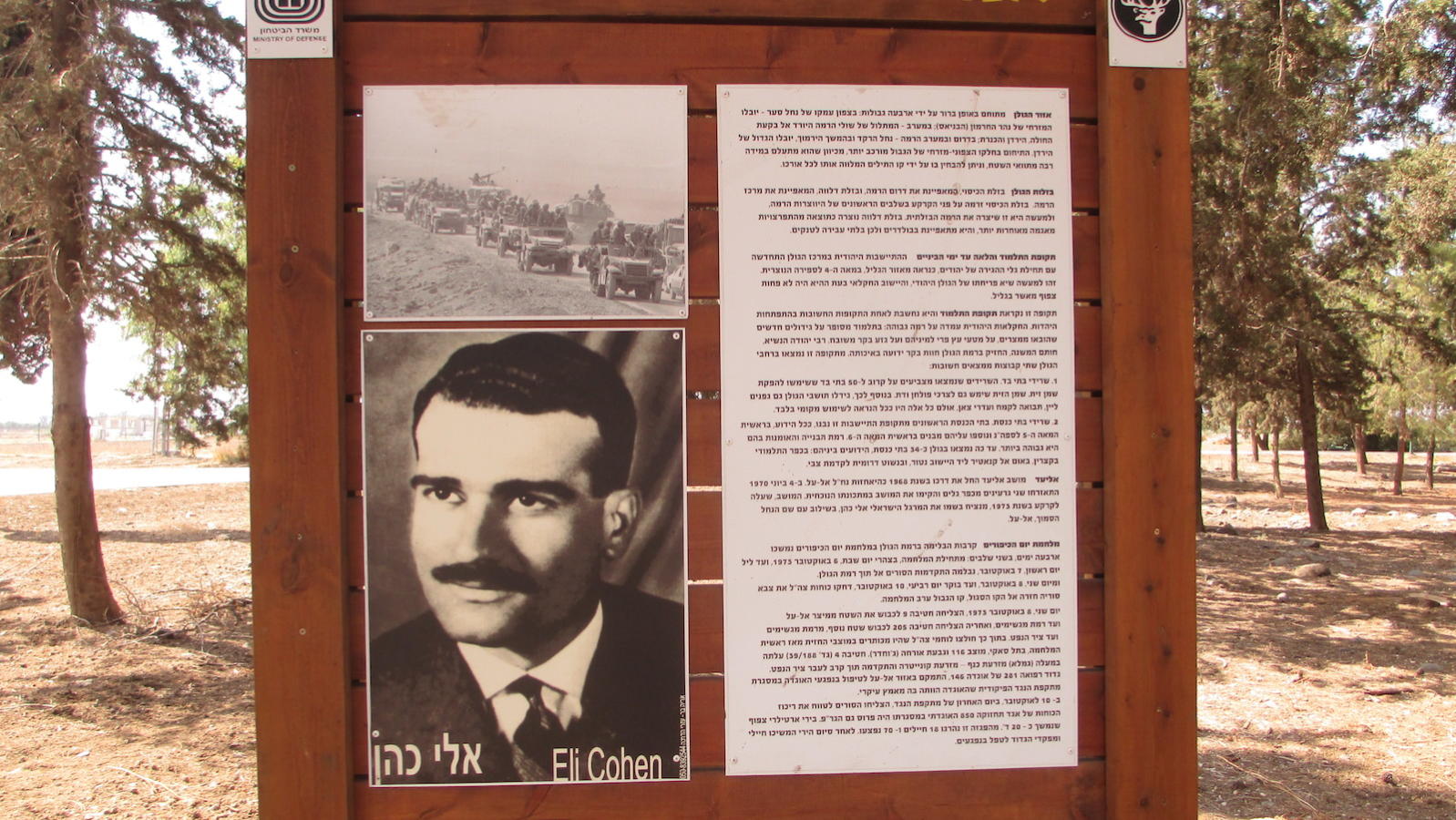In the 1967 Six Day War, Israel was able to quickly and efficiently conquer the Golan Heights. This feat would not have been possible without the information provided by Israeli spy Eli Cohen, who had been executed in Syria two years earlier. Cohen worked undercover in Syria for years before his capture, and his reputation as Israel’s greatest spy continues to this day.
Eli Cohen (pictured, at center) was born in Egypt in 1924 to Jewish parents who had immigrated to Alexandria from Aleppo, Syria. In 1949, shortly after the State of Israel was established, Cohen’s parents and brothers moved to Israel. Eli stayed behind, helping to coordinate Jewish and Zionist activities in Egypt, even though it was a dangerous and risky endeavor. In 1955 Cohen underwent intensive espionage training in Israel. He returned to Egypt with hopes of helping Israel, but was put under immediate surveillance by the Egyptian authorities. In 1956, as Egypt and Israel were fighting in the Sinai Campaign, the remaining Jews of Alexandria were expelled, and Cohen finally made his home in Israel. In 1959 he married an Iraqi Jew, Nadia Majald, and together they had three children.
Recruitment into the Mossad
In 1960, Cohen was approached by the Mossad for a mission in Syria. Israeli intelligence was particularly excited about Cohen because of his Arab features and his knowledge of Arabic, English, and French. Cohen immediately began training and developing his cover. The first part of his mission would be spent in Buenos Aires establishing his identity as Kamal Amin Ta’abet, a Syrian émigré living in Argentina. In 1961, Nadia saw him off at the airport. She was told only that her husband would be working for the Ministry of Defense.
Cohen spent a year in Argentina, cultivating a reputation as a wealthy businessman and a social butterfly with contacts that included many politicians and diplomats. In 1962, he traveled to Damascus. Using the contacts he had established in South America, he began to befriend members of the leadership of the Ba’ath party, which was poised to take control of Syria.
With your help, My Jewish Learning can provide endless opportunities for learning, connection and discovery.
Kamal Amin Ta’abet became known as an avid host whose apartment was open for government officials who wanted to come enjoy the company of women and wine. While those around him became drunk and let down their guards, talking freely of secret and sensitive information, Cohen feigned intoxication and listened carefully. Every few days he used a radio transmitter that he had hidden in his room to send information back to Israel.
In 1964, Syria began a project that was intended to divert water from the Jordan River away from Lake Kinneret, the source of much of Israel’s water supply. Cohen notified Israeli officials, and subsequently the Israeli Air Force was able to bomb the equipment being used to carry out the diversion.
Contributions to the Six Day War
Overlooking Israel, the Golan Heights was a vital part of Syrian defense strategies, as it was nearly insusceptible to Israeli attacks. Only top Syrian military staff were allowed there to view the defenses that were set up, but Cohen succeeded in visiting every defense position, brought by senior staff officers. Perhaps the most famous contribution Cohen made to Israeli strategic defense was his seemingly-innocent suggestion that planting trees around Syrian fortification would provide foliage cover and shade for troops. The Syrian army officer who heard this idea agreed, and acted on it. When Israel was taking the Golan Heights in 1967, the IDF was able to use these trees to pinpoint where the Syrian defense positions were.
Between 1962 and 1965, Cohen returned to Israel to see his family only three times. On his final trip to Israel, in 1964, Cohen expressed concern over the new commander of Syrian intelligence, Colonel Ahmed Su’edani, who obviously did not like or trust him. Cohen requested to be taken off assignment, but intelligence officers convinced him to go back to Syria one final time.
By January of 1965 Syrian officials were increasingly alarmed at the obvious intelligence leak in their midst. Aided by Russian advisers with very sensitive intelligence-gathering equipment, the Syrians were able to precisely locate the site of the transmissions to the Israelis. On January 24th, 1965, Syrians raided Cohen’s apartment, where he was caught in the middle of a transmission.
Eli Cohen was tried in a brief military tribunal, but was denied any defense. On May 8, 1965, the sentence was handed down at a press conference—Eli Cohen was to be hanged. Despite pleas from leaders and diplomats, including Pope Paul VI, there was to be no appeal. Ten days later Cohen was allowed to write a letter to his wife, and meet briefly with a Rabbi before he was hanged in front of a crowd of more than 10,000 people.
Campaign to Return His Body
Eli Cohen’s remains have never been returned, and his family continues to petition the Syrian government to release his body for burial in Israel. As recently as 2009, Cohen’s family asked Pope Benedict XVI to intervene on their behalf.
Cohen’s devotion to his country, and his bravery in the face of his Syrian captors, has earned him the affectionate title in Israel, “Our Man in Damascus.” On the 40th anniversary of his death, then-Prime Minister Ariel Sharon said that Cohen was a, “fighter who became a legend when he entered the lion’s den alone.” And though he did not emerge alive, his contribution to Israeli history is a vital one.



